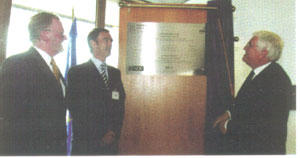| 2006 |

|
YEAR BOOK |
University College Cork
|
Environmental Research Institute - facilitating a multidisciplinary approach
|

Introduction
The quality of Ireland's environment remains relatively good overall but the recent growth of our economy and population places a host of new pressures on our environment and presents new challenges for sustainable development. Dedicated research will continue to play a key role in environmental protection through developing a more sophisticated understanding of the impact of human activities on the environment, offering support for rational policy decisions, ensuring compliance with international environmental protocols and developing environmental technologies that result in reduced environmental impact. The Environmental Research Institute (ERI) at University College Cork strives to provide this type of "enabling environmental research" that will help us to continue to grow and develop our economy without degrading our environment.
A multi-disciplinary approach
The ERI was established in 2000 with seed funding from the Higher Education Authority's PTRLI2 programme. The mission at the Institute is to support environmental research and education at UCC. The Institute integrates environmental research from 15 different departments and four centres of excellence into one institute thereby facilitating a critical collaborative approach to a subject area that straddles many different disciplines. A holistic approach is particularly crucial in the area of environmental research in order to study, and solve, many of the complex environmental challenges we face as a society. The interdisciplinary research environment at the ERI enables researchers to work together in large. multi-skilled teams that draw on each discipline's core competences to address scientific questions of environmental relevance in a synergistic manner.
Research at ERI
Research activities at the Institute are strategically focused on five thematic research areas:
� The Marine and Freshwater thematic area addresses fundamental questions of marine and freshwater biology, fluid mechanics, hydraulic engineering, geology, freshwater catchments and contributes to applied research in aquaculture and fisheries conservation.
� The Biodiversity & Ecotoxicology theme investigates the causes and consequences of biodiversity change in natural and managed ecosystems and carries out research into the mechanisms of biological action of chemicals and the development of biomarkers.
� The Environmental Chemistry thematic area monitors and models the atmospheric chemistry of pollutants, develops techniques for detection of trace gases and catalysts for "green" chemistry & processing.
� Sustainable Energy and Environmental Engineering addresses key research areas covering energy/environment.energy end use and energy policy. Special research focus areas include wind, ocean solar or biofuel-based energy together with studying energy use in buildings.
� The Environmental Microbial Genomics thematic area aims to gain a fuller understanding of how microbes grow and interact in their ecological niches; an approach which is fundamental to their exploitation for biotechnological applications.

The ERI also provides logistic and teaching support for the training of undergraduate and postgraduate students in the area of environmental science and environmental studies. The Institute is linked to the Environmental Change Institute (National University of Ireland, Galway) and the Centre for Environmental Research (University of Limerick) through the Institute for Environmental Studies, a cooperative initiative within the Atlantic Universities Alliance.

ERI facilities
Overlooking the River Lee, and close to the UCC campus, the ERI facility has 3000 sq. metre of customised laboratories, pilot trial space, environmental control rooms, office space and two seminar rooms with the capacity to house over 100 researchers. The building has "breakout" areas that are designed to encourage the researchers from the different disciplines to meet, socialise and share and discuss information and ideas with each other. It has been built to the highest standards of contemporary sustainable design with many sustainable energy features such as solar panels, geothermal heat pumps and heat recovery systems funded by Sustainable Energy Ireland. The ERI building was occupied in January 2006 and officially opened in June 2006 by Mr Dick Roche TD, Minister for the Environment, Heritage and Local Government. The new Director of the Institute is Professor Alan Dobson.
Contact: Dr Paul Bolger.
Manager, Environmental Research Institute,
University College Cork, Lee Road, Cork.
E-mail: [email protected]
Website: http://eri.ucc.ie